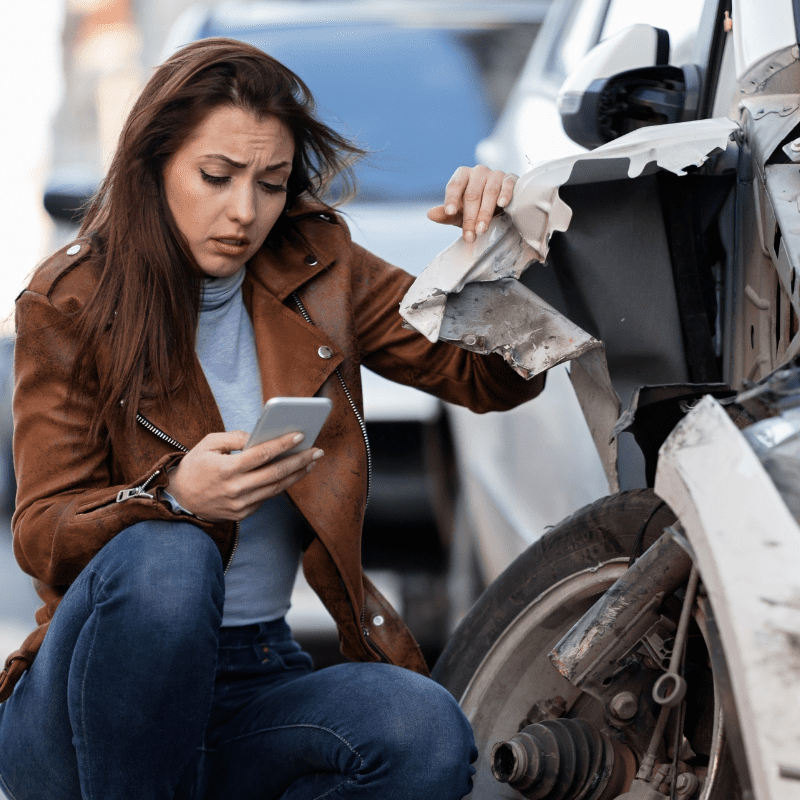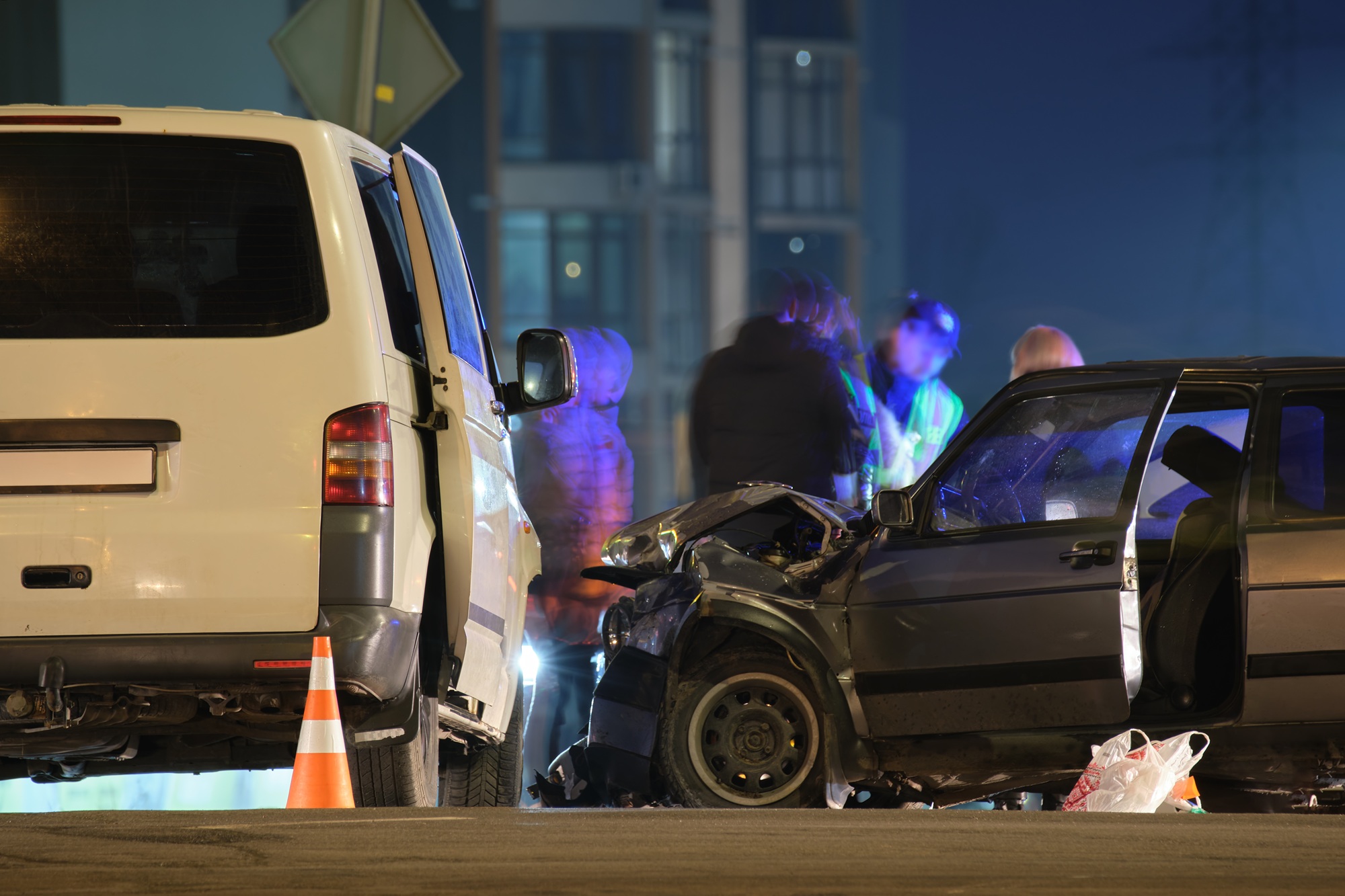From 2019 to 2023, over 9,000 crashes in Nevada resulted in serious injuries or fatalities. Were you recently injured in a car accident? You may be entitled to file a personal injury claim against the driver or drivers who hurt you.
In this blog, our expert personal injury lawyers will answer questions you may have after your accident, including steps to protect yourself, damages you can pursue with the assistance of a qualified attorney, and what you need to win a claim successfully. Are you a car accident victim? Here’s what you need to know.
What Are Common Causes of Car Accidents?
Car accidents can happen at any time of day or night anywhere in Nevada, including neighborhoods and the highways that connect our cities.
Our car accident lawyers bring decades of experience to every case. We’ve successfully represented victims in many different types of crashes. Whatever circumstances led to your injury, our attorneys have handled similar situations and know how to address your specific challenges.
Though less common, head-on collisions can be catastrophic because of the position of the vehicles and the range of damage they can sustain. Head-on collisions are often caused by wrong-way driving, impaired driving, driving across the center line into oncoming traffic, or medical events while driving, such as falling asleep at the wheel or having a seizure while driving.
Rear-end collisions, often caused by tailgating or inattentive driving, occur when one car slams into the tailgate of another. At times, this can cause a domino effect, causing one car to slam into another, which crashes into the car ahead of it, and so on.
These accidents typically involve larger vehicles, such as SUVs, commercial trucks, and delivery vans. They can cause severe injuries, especially at higher speeds, and may involve multiple vehicles and victims. These accidents can happen when a vehicle changes lanes abruptly without checking its blind spots.
When drivers fail to obey the rules of the road, such as running red lights and speeding through stop signs, they can “t-bone” unsuspecting vehicles. As side panels offer less protection than the front and back of a vehicle, car accident victims can end up with terrible injuries.
Unfortunately, car accident scams are common across the U.S., and innocent victims may not realize they’ve been involved in a staged car accident. These staged accidents can involve one or more vehicles strategically positioned at intersections, near merging lanes, or cars preparing to pull out from the curb.
Sneaky movements by scammers cause the victim to brake suddenly or trap them in traffic lanes, so they have no choice but to slam into another car, giving the appearance of causing an accident. Unchecked, these staged automobile accidents can hurt innocent victims.
Be aware of your surroundings and look for these warning signs you may be the victim of a staged car accident:
- Other vehicles that appear to be working in unison
- Cars that flee the accident scene
- Drivers who refuse to provide insurance information
- Drivers who refuse to call police
- Drivers asking for your wallet rather than sharing personal information
Trust yourself in potential car accident scams. Stay calm, call the police, gather contact information from witnesses, document your recollection of events, photograph damages, and, above all, contact a car accident attorney who can hold these staged car accident perpetrators accountable.
How Can I Protect Myself After a Car Accident?

Every vehicle accident victim should take steps to protect their health and well-being after a collision. What you do (or don’t do) in the aftermath can impact your physical and financial recovery and any potential legal proceedings to come.
After successfully representing car accident victims for decades, Coulter Harsh Law has identified a few crucial steps to significantly reduce stress and set a solid foundation for seeking justice.
- Safety Comes First
- Take Your Injuries Seriously and Seek Medical Attention
- Call Law Enforcement and Get a Police Report
- Exchange Information With the Other Driver or Drivers
Turn on your hazard lights first. If you can move your vehicle off the road or out of the way of traffic, do so immediately. Some people have road flares in their cars, and if that’s you, set them up to mark the accident scene. It’s okay if you’re too shaken to act; wait for first responders to arrive. Stay calm, and let the professionals help.
Never hesitate to call 911 or ask for a witness to call 911 after a vehicle accident. After a sudden event like this, your body releases adrenaline and endorphins, which can dull pain and mask the extent of your injuries. Injuries common during car accidents include:
- Traumatic brain injuries
- Spinal cord injuries
- Neck or back injuries
- Whiplash
- Burns
- Loss of limb
- Scrapes and cuts
- Sprains and strains
- Bone fractures
- Broken bones
- Internal injuries, like organ ruptures and bleeding
Bottom line: It’s best to seek medical attention, and if you have any obvious injuries, call an ambulance. Go to the hospital if the medical professionals recommend you do.
Even if you initially feel fine or believe you only have minor bumps and bruises, an injured person may not be thinking clearly. The quicker you have a medical provider evaluate you and receive medical treatment for injuries you may not be aware, the quicker you have a medical record that supports your story.
Especially since some injuries can take time to show up, such as soft tissue injuries, whiplash, concussions, or back pain, you need to pay close attention to how you’re feeling and seek help willingly.
The at-fault driver’s legal representation can use any delays or skipped treatment to cast doubt over your injuries. Don’t let them.
After a car crash, your injuries may be beyond the physical; it’s common for accident victims to struggle with anxiety, depression, and even a formal diagnosis of post-traumatic stress disorder (PTSD). These accidents can impact many areas of your life, and you deserve relief.
You can protect yourself from the moment you collide with the other car. Even if the driver wants to keep the police out of your accident, you need to call them regardless.
Having law enforcement on the scene allows for creating an accident report after an investigation, which can be used in your claim. Police officers will take statements, document the scene, and ensure everybody’s safety.
Before you leave the scene, ask for the police officers’ names and badge numbers for your records. Ask for a copy of the police report or the police report number, and make sure you receive one. Your lawyer will need the report to support your claim.
Only after you verify the scene is safe and everybody’s receiving the medical attention they need, ask for contact information from the other driver.
- Full name and contact information (address, phone number, etc.)
- Insurance company and policy number
- Driver’s license information and license plate number
- Type, color, and vehicle model
- Accident location
You may also ask for contact information from any witnesses, which you can pass to your car accident attorney. Law enforcement will also speak with witnesses and document their names and contact information, so it’s okay to prioritize other actions on this list.
Important Reminder: Do Not Discuss Fault
Tempting as it may be, especially if you’re understandably upset after the accident occurs, remain calm and focused on exchanging information only. Do not make accusations or discuss whether the other driver is or is not at fault. Do not admit fault. Let your lawyer handle the proof of fault after gathering materials in order to fully assess fault.
Gather Evidence and Document Your Experience
If your cell phone was undamaged in the crash, use it to photograph the scene, your vehicle, the other vehicles involved, and your injuries. Take pictures from different angles to show any surrounding property damage, such as knocked-over street signs, scratches in curbs, or broken fences.
Writing down what you can remember can also help build a strong car accident claim.
Notify Your Insurance Provider
You can immediately call your insurance provider at the scene if your injuries are stable. If you get a representative on the phone, they may be able to advise you on what towing trucks to call and an automotive repair shop to take your vehicle ahead of filing an insurance claim.
Your provider will assign an adjuster to your insurance claim as the process progresses. This adjuster will evaluate your evidence, determine who was at fault, and estimate repair costs.
What if the Car Accident Wasn’t My Fault?
A successful car accident claim depends on how effectively the law firm you hire proves negligence or recklessness on the part of the other driver or drivers. The so-called “at-fault driver” needs to have acted outside of what is typically considered reasonable by your average citizen.
- Speeding
- Disobeying traffic signs and rules
- Failing to adjust to weather conditions
- Texting while driving
- Inattentive driving
- Applying makeup while driving
- Eating and drinking while driving
- Operating a vehicle with known maintenance issues (e.g., burned-out taillights)
- Failing to lower speeds in construction zones
- Programming GPS systems while driving
Although you can pursue a claim through insurance companies and your evidence gathering alone, these claims can be complex. A lawyer can help you navigate the nuances, compile strong evidence, and secure the full extent of the damages you’re owed.
Besides, insurance companies often try to undercut your compensation, and a good lawyer will not stand by and watch that happen. Additionally, the best thing you can do to recover is give yourself the space and time to do so. A lawyer can take on the lion’s share of the legal aspects, giving you time to focus on your physical and emotional recovery.
What Types of Damages Can I Claim After a Car Accident?
After a car accident that wasn’t your fault, you can claim damages in all the areas of your life that have been impacted. A car accident lawyer can work with you to seek damages for:
- The costs to repair or replace your vehicle
- The costs of property damage, such as jewelry, glasses, or electronics in your vehicle during the crash
- The cost of medical bills, including immediate stabilization, emergency room care, and surgery
- Future medical expenses, such as rehabilitation, follow-up visits, and pain management
- Replacement of lost wages if you need to be out of work for some time while you recover
- The costs of reduced earning capacity if you sustain a temporary or permanent disability
- The cost of emotional distress, including mental anguish, anxiety, and other trauma-related symptoms
- The cost of loss of consortium for your spouse, wherein you’re unable to participate in family life as you were before (e.g., negative impacts on your ability to share household responsibilities with a spouse)
- Other expenses, such as the tow truck, vehicle storage, legal costs, and more.
A qualified attorney can help determine what you can seek damages for, and an attorney worth your time will pursue the full extent of damages possible. You should always feel like you matter around a personal injury lawyer.

When Should I Call a Car Accident Attorney?
You should call a car accident attorney quickly after an accident, especially if you’re injured to obtain timely legal advice. The sooner a qualified law firm like Coulter Harsh Law advocates for you, the smoother the legal process can go. It also takes a significant administrative burden off your shoulders while focusing on your recovery.
- You were injured during the accident.
- Somebody passed away as a result of the accident.
- It’s unclear who is liable for the accident.
- The other parties refuse to acknowledge responsibility.
- The accident involved multiple drivers, pedestrians, and businesses.
- The other driver was uninsured or underinsured.
- The auto insurance companies refuse to communicate, underestimate repairs/damages, or deny coverage outright.
If you’re unsure whether you need a lawyer, you can always seek a free consultation to understand your options. Many law firms in Nevada offer this.
How Long Do I Have to File a Car Accident Claim?
Let's Find Out.
The statute of limitations in Nevada for filing a claim is generally two years after the accident occurs. There are a few notable exceptions: In wrongful death lawsuits, the two-year timeframe starts when the victim passes away, not at the time of the accident (unless they pass away at the scene).
1
The statute of limitations for minors is paused until they turn 18. Once they turn 18, they have two years to file a claim.
2
If a government employee or entity is involved in your accident, you have 180 days to file a claim against the government. If that claim is denied, you have two years to file a personal injury lawsuit from the time of the accident.
Recovery Is in Your Future
With Coulter Harsh Law

Surviving a car accident is only the first step towards recovery. If you’ve recently been a car accident victim and sustained injuries, you know how overwhelming the experience can be.
Not only do you have to worry about your immediate safety and any physical injuries, but a car accident can shake your sense of safety, impact your finances, not know where to turn medically and leave you in need of justice.
Especially if somebody else’s negligence or recklessness caused your accident, a personal injury claim is warranted and can help you recover financially. But pursuing justice can be a long road; you shouldn’t walk it alone.
Our experienced attorneys at Coulter Harsh Law specialize in personal injury claims and have a track record of successful claims outcomes.




 Pursu Agency
Pursu Agency